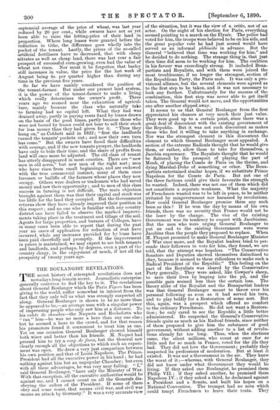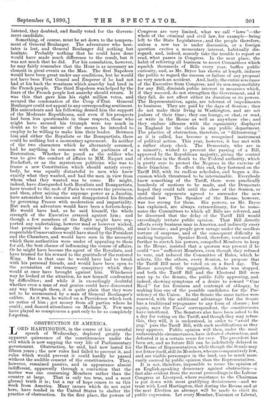THE BOULANGIST REVELATIONS.
THE secret history of attempted revolutions does not nowadays long remain secret. Journalistic enterprise generally contrives to find the key to it. The revelations about General Boulanger which the Paris Figaro has been giving to the world, suffer somewhat in interest from the .fact that they only tell us what was strongly suspected all along. General Boulanger is shown to be no more than 'he appeared to be,—an average man with a singular power of impressing people who only saw him at a distance. To his valets de chambre—the Naquets and Rocheforts who " ran " him—he was no more a hero than any one else ; but he seemed a hero to the crowd, and for that reason his promoters found it convenient to treat him as one. Yet on one occasion General Boulanger showed himself both wiser and better than his friends. M. Naquet had pressed him to try a coup de force, but the General saw clearly enough all the objections to which such an experi- ment was open. He drew a very just comparison between his own position and that of Louis Napoleon. The Prince- President had all the executive power in his hand ; he had nothing against him but an unpopular Chamber; but even with all these advantages, he was very near failing. " I," said General Boulanger, " have only the Ministry of War. With that exception, all the executive authorities would be against me, and I cannot count on all the Generals dis- obeying the orders of the President. If some of them obey and some resist, that means civil war, and civil war means an attack by Germany." It was a very accurate view of the situation, but it was the view of a. critic, not of an actor. On the night of his election for Paris, everything seemed pointing to a march on the ]lysee. The police had voted for him, the troops were believed to be on his side, and the great popular vote he had just scored would have served as an informal ple'biscite in advance. But the General " believed that time was working for him," and he decided to do nothing. The strange thing is, that just then time did seem to be working for him. The coalition in his favour was exceedingly strong. It included Bona- partists and Royalists, and with them were joined the most troublesome, if no longer the strongest, section of the Republican Party, the Paris mob. It was only a pro- visional alliance, but the several elements were agreed as to the first step to be taken, and it was not necessary to look any further. Unfortunately for the success of the combination, this first step was never able to get itself taken. The General would not move, and the opportunities one after another slipped away. It seems to us that General Boulanger from the first appreciated his chances at very much their just value. They were good up to a certain point, since there was a great deal of discontent with the existing government of the Republic. But it was not such discontent as makes those who feel it willing to take anything in exchange. Nor was the strongest element in this discontent the element to which General Boulanger most appealed. A section of the extreme Radicals thought that he would give them, or rather, allow them to take for themselves, a Jacobin supremacy. The Royalists thought that he would be flattered by the prospect of playing the part of Monk, of placing the Comte de Paris on the throne, and dying Marshal-Duke of something or other. The Bona- partists entertained similar hopes, if we substitute Prince Napoleon for the Comte de Paris. But not one of the three factions could give their favourite the strength he wanted. Indeed, there was not one of them which did not constitute a separate weakness. What the majority of Frenchmen wanted was to be left in peace, to be neither irritated by misgovernment nor harassed by revolutions. How could General Boulanger promise them any such boon as this ? If he won the day by means of his own friends, there was no security that France would not be the loser by the change. The vice of the existing Government was its tendency to coquet with Jacobinism. But the men who were urging General Boulanger to put an end to the existing Government were worse Jacobins than the people they proposed to replace. When M. Floquet promised to make General Boulanger Minister of War once more, and the Royalist leaders tried to per- suade their followers to vote for him, they found, we are told, that the attempt was hopeless. "The Conservative Senators and Deputies showed themselves disinclined to obey, because it seemed to them ridiculous to make such a Radical President of the Republic." This feeling on the part of the Royalists was shared by the Conservative Party generally. They were asked, like Cowper's sheep, to save their lives by leaping into the pit, and the possible gain seemed less than the certain loss. The theory alike of the Royalist and the Bonapartist leaders was that General Boulanger meant to throw over his personal following as soon as it had served his turn, and to play boldly for a Restoration of some sort. But this, again, was a prospect which offered no comfort to the ordinary Frenchman. He did not want a Restora- tion ; he only cared to see the Republic a little better administered. He suspected the General's Conservative friends quite as much as his Radical friends, since neither of them proposed to give him the substance of good. government, without adding another to a list of revolu- tions already far too long. Thus, when the elections came, the silent millions, who count at once for so little and for so much in France, voted for the ills they had. They did not love the Government; probably they suspected its professions of moderation. But at least it existed. It was not a Government in the air. They knew the worst of it ;—whereas, with General Boulanger, they did not know under what Government they would be living. If they asked. one Boulangist, he promised them Philip VII. ; if they asked another, he promised them Napoleon IV. ; if they asked a third, he declaimed against a President and a Senate, and built his hopes on a National Convention. The trumpet had no note which could tempt Frenchmen to leave their tents. They listened, they doubted, and finally voted for the Govern- ment candidate.
Something, of course, must be set down to the tempera- ment of General Boulanger. The adventurer who hesi- tates is lost, and General Boulanger did nothing but hesitate. Probably nothing that he could have done would have made much difference to the result, but it was not much that he did. For his consolation, however, he may fairly remember that the Hour is as necessary an element in great events as the Man. The first Napoleon would have been great under any conditions, but he would not have been First Consul and Emperor if he had not had at his back the weariness which anarchy had bred in the French people. The third Napoleon was helped by the fears of the French people lest anarchy should return. It was this that gave him his eight million votes, and secured the condonation of the Coup d'Rtat. General Boulanger could not appeal to any corresponding sentiment. His antecedents and his following denied him the support of the Moderate Republicans, and even if his prospects bad been less questionable in these respects, those who might have secured his triumph were too much in doubt as to the nature of the means he intended to employ to be willing to make him their leader. Between him and either the Royalists or the Bonapartists, there could be nothing but a momentary agreement. In neither of the two characters which he alternately assumed, had he anything in common with the partisans of a Restoration. Whether he posed as the soldier who was to give the conduct of affairs to MM. Naquet and Rochefort, or as the mysterious politician who was to frame a new Constitution which should satisfy every- body, he was equally distasteful to men who knew exactly what they wanted, and had the men in view from whom what they wanted was to come. He might, indeed, have disregarded both Royalists and Bonapartists, have trusted to the mob of Paris to overawe the provinces, and then, after seizing the supreme power as a Jacobin, have astonished his enemies and disappointed his friends by governing France with moderation and impartiality. But such an adventure would have been a forlorn-hope. He would have had, as he said himself, the whole strength of the Executive arrayed against him ; and though a few members of the Right might have sup- ported any undertaking, however mad or however wicked, that promised to damage the existing Republic, all respectable Conservatives would have stood by the President and the Chambers, and would have seen in the necessity which these authorities were under of appealing to them for aid, the best chance of influencing the course of affairs. Or he might have become the agent of the Royalists, and have trusted for his reward to the gratitude of the restored King. But in that case he would have had to break with his personal friends, and would have been open to the accusation of reactionary conspiracy which they would at once have brought against him. Whichever way he looked at the situation, he saw himself confronted by difficulties ; and while it is exceedingly doubtful whether even a man of real genius could have discovered any way through them, it is quite plain that they were not to be surmounted by a man of General Boulanger's calibre. As it was, he waited on a Providence which took no notice of him ; got money from all parties where he could ; and danced attendance on Madame X. Few men have played so conspicuous a part only to be so completely forgotten.



































 Previous page
Previous page